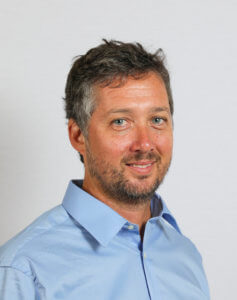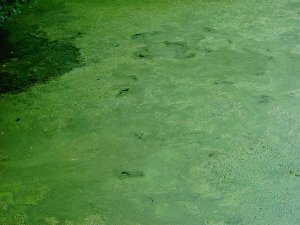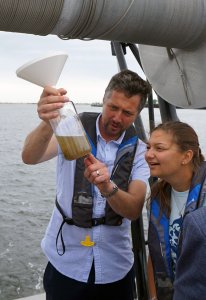Monmouth University Endowed Associate Professor of Marine Science Jason Adolf has been selected to lead a Harmful Algal Bloom (HAB) Expert Team formed to provide guidance to the New Jersey Department of Environmental Protection (NJDEP) on HAB prevention, mitigation and management for the state’s lakes and other waterbodies.
 Through an initiative launched by Gov. Phil Murphy, the NJDEP Division of Water Monitoring and Standards and the New Jersey Sea Grant Consortium recruited Adolf and nine other cyanobacterial HAB and lake management experts to help build the state’s capacity for HAB response. The team will complete a comprehensive literature review on the prevention and treatment of HABs, examine HAB and water quality data, and develop guidance documents for New Jersey lake managers that include best management practices for the prevention and management of HABs.
Through an initiative launched by Gov. Phil Murphy, the NJDEP Division of Water Monitoring and Standards and the New Jersey Sea Grant Consortium recruited Adolf and nine other cyanobacterial HAB and lake management experts to help build the state’s capacity for HAB response. The team will complete a comprehensive literature review on the prevention and treatment of HABs, examine HAB and water quality data, and develop guidance documents for New Jersey lake managers that include best management practices for the prevention and management of HABs.
The team will also provide technical advice and reviews on proposed mitigation technologies for lakes and review the progress of NJDEP-funded HAB mitigation grant projects. Additionally, the team will develop a HAB lake management training program for NJDEP staff and interested stakeholders and conduct training workshops at various locations in the state. More information on HABs in New Jersey and the governor’s initiative can be found at nj.gov/dep/hab/.
The HAB issue gained increased statewide attention in 2019, when lengthy closures at the summer tourism destinations of Lake Hopatcong and Greenwood Lake strained local economies. In an op-ed published by New Jersey news outlets at the time, Adolf warned that the situation could have been far worse, as toxin levels remained relatively low in the lakes even though HAB biomass was elevated. However, he wrote that “it is only a matter of time before our luck runs out.”

“The impacts of humans, including excess nutrient loading to lakes, elevated CO2 levels and rising water temperatures due to climate change, will not only ensure the reoccurrence of these blooms but stack the odds in favor of them becoming toxic and a far more menacing public health threat than what we currently see in New Jersey,” Adolf wrote. “Research into these linkages must play an important role in directing actions for solutions.”
Adolf coordinates the Coastal Lakes Observing Network (CLONet), an innovative citizen science effort that is building a greater understanding of the prevalence and causes of HABs in Deal Lake, Fletcher Lake, Lake Como, Lake Takanassee, Silver Lake, Spring Lake, Sylvan Lake, Sunset Lake, Wesley Lake and Wreck Pond. Adolf runs the Phytoplankton and Harmful Algal Bloom research lab (PHABLab) at Monmouth University, where he is also working with undergraduates to study HABs in Monmouth County surfing beaches and waterways including Sandy Hook and Raritan bays and the Shrewsbury and Navesink river watersheds.
 He joined Monmouth in 2017 after nine years at the University of Hawaii at Hilo, where he served as the chair and associate professor of marine science. Adolf, whose research background is in the field of phytoplankton ecology and evolution, has made significant contributions to the literature in the area of HABs. Before going to Hilo, he spent five years at the University of Maryland Institute of Marine and Environmental Technology in Baltimore, conducting HAB research that included Chesapeake Bay; the Swan River Estuary in Perth, Western Australia; and the Plymouth Culture Collection of the Marine Biological Association of the U.K.
He joined Monmouth in 2017 after nine years at the University of Hawaii at Hilo, where he served as the chair and associate professor of marine science. Adolf, whose research background is in the field of phytoplankton ecology and evolution, has made significant contributions to the literature in the area of HABs. Before going to Hilo, he spent five years at the University of Maryland Institute of Marine and Environmental Technology in Baltimore, conducting HAB research that included Chesapeake Bay; the Swan River Estuary in Perth, Western Australia; and the Plymouth Culture Collection of the Marine Biological Association of the U.K.

